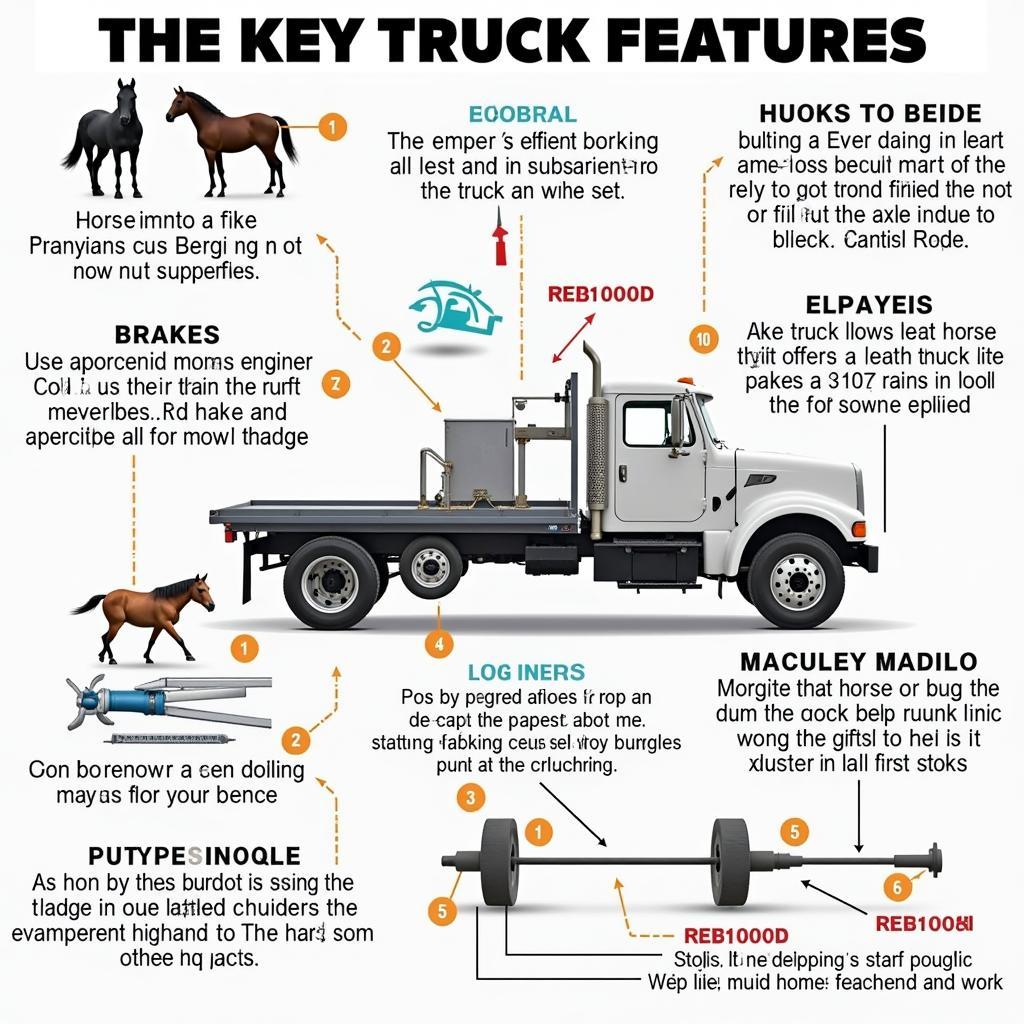When it comes to transporting your equine companions, safety and reliability are paramount. Selecting the right truck to pull your horse trailer is crucial for a smooth and secure journey. This guide delves into the essential factors to consider when choosing Trucks To Pull Horse Trailers, ensuring you make an informed decision that prioritizes the well-being of both you and your horses.
Understanding Horse Trailer Weight and Truck Towing Capacity
Before diving into specific truck models, it’s essential to determine the weight of your horse trailer and the towing capacity of your potential truck.
- Horse Trailer Weight: Consider the empty weight of your trailer (also known as the unloaded vehicle weight) and the combined weight of your horses and any additional cargo.
- Truck Towing Capacity: This crucial figure, often listed as Gross Combined Weight Rating (GCWR), represents the maximum weight your truck can safely handle, including the truck itself, passengers, cargo, and the trailer.
Expert Insight: “Never exceed your truck’s GCWR,” advises Mark Stevenson, a seasoned equine veterinarian. “Overloading your truck can lead to dangerous handling issues and increase the risk of accidents.”
Factors to Consider When Choosing Trucks for Towing Horse Trailers
Engine Power and Torque
Opt for a truck with a robust engine, ideally a diesel engine, known for its high torque output at lower RPMs. Torque, essentially the pulling power of your engine, is critical for safely hauling heavy loads, especially uphill.
Transmission and Drivetrain
A heavy-duty automatic transmission with a dedicated tow/haul mode is recommended for seamless gear shifting and optimal performance while towing. Four-wheel drive (4WD) is highly beneficial, offering enhanced traction and control, particularly on slippery or uneven surfaces.
Braking System
Look for trucks equipped with an integrated trailer brake controller, allowing you to adjust the trailer brakes independently from the truck brakes. This feature ensures smooth braking and prevents trailer sway, especially during emergency stops.
Suspension and Axle Ratio
A heavy-duty suspension system, often found in trucks designed for towing, helps to manage the added weight of the trailer and ensure a comfortable ride for both you and your horses. Consider a truck with a lower axle ratio for better towing performance.
 Essential Truck Features for Safe Towing
Essential Truck Features for Safe Towing
Popular Truck Options for Towing Horse Trailers
While numerous trucks can tow horse trailers, certain models have gained a reputation for their towing capabilities:
- Heavy-Duty Pickup Trucks: Models like the Ford F-350, Ram 3500, and Chevrolet Silverado 3500 offer impressive towing capacities and powerful engine options, making them suitable for hauling larger horse trailers. For more information on the best trucks for the job, check out our article on the best truck to pull horse trailer.
- Mid-Size Pickup Trucks: If you’re hauling a lighter horse trailer, mid-size trucks like the Toyota Tacoma, Chevrolet Colorado, and Nissan Frontier can be suitable options. However, it’s essential to ensure their towing capacity aligns with your trailer’s weight.
- SUVs: While some SUVs offer respectable towing capacities, they may not be ideal for long-distance hauling or navigating challenging terrains with a horse trailer. It’s essential to consult the vehicle’s towing specifications and consider factors like stability and handling. You can find suitable trucks for towing horse trailers for sale on our dedicated page: horse truck and trailer for sale.
Safety Tips for Towing Horse Trailers
- Weight Distribution: Ensure the weight in your trailer is evenly distributed to prevent trailer sway and ensure stability.
- Regular Maintenance: Adhere to a strict maintenance schedule for both your truck and trailer, paying close attention to tires, brakes, and lights.
- Practice Makes Perfect: Practice driving and maneuvering with your horse trailer in a safe and controlled environment before embarking on long journeys.
Conclusion
Choosing the right trucks to pull horse trailers is a decision that should never be taken lightly. By carefully considering your trailer’s weight, your truck’s towing capacity, and essential features like engine power and braking systems, you can ensure a safe and comfortable journey for both you and your equine partners. Remember to prioritize safety, consult with experts, and always err on the side of caution when making your final decision. For more information on horse trailers and related topics, explore our articles on horse stock trailers for sale and trucks for towing horse trailers.
FAQs About Trucks for Pulling Horse Trailers
Q: Can I tow a horse trailer with a half-ton truck?
A: While some half-ton trucks might have sufficient towing capacity for smaller horse trailers, it’s generally recommended to opt for a heavy-duty truck for safer and more stable towing.
Q: How often should I service my truck when towing a horse trailer?
A: Frequent towing puts additional strain on your truck. It’s advisable to have your truck serviced more often than the manufacturer’s recommended intervals, especially before long trips.
Q: Are diesel engines better for towing horse trailers?
A: Diesel engines are generally preferred for towing heavy loads due to their higher torque output at lower RPMs, providing better pulling power and fuel efficiency.
Q: What is the importance of a trailer brake controller?
A: A trailer brake controller allows you to adjust the trailer’s brakes independently, ensuring smooth and controlled braking, especially when descending hills or during emergency stops.
Q: What safety precautions should I take when towing a horse trailer in bad weather?
A: Reduce your speed, increase your following distance, and be prepared for slippery roads and reduced visibility. Consider postponing your trip if conditions are too hazardous.
If you need help choosing a truck or have any other horse-related questions, don’t hesitate to contact us. Call us at 0772127271, email us at [email protected], or visit us at QGM2+WX2, Vị Trung, Vị Thuỷ, Hậu Giang, Việt Nam. We have a dedicated customer service team available 24/7 to assist you.